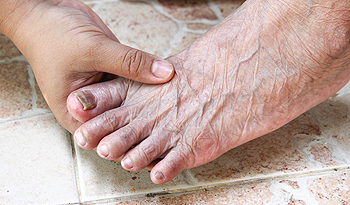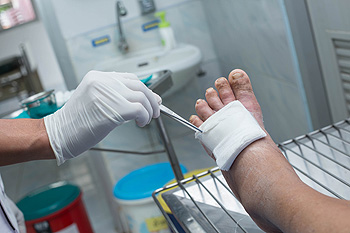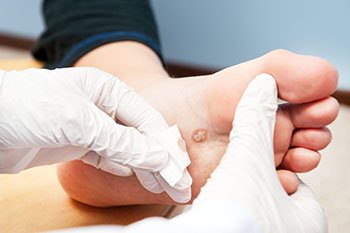
Please contact our office to schedule an appointment or for more information.
We often think of flexibility as being an important part of physical fitness - but when was the last time that you thought about the flexibility of your feet? The feet are often neglected when it comes to stretching and improving flexibility. This is unfortunate, as the feet can greatly benefit from being flexible. Our feet absorb shock when we walk or run while also acting as rigid levers for pushing off the ground. By molding and adapting to the surfaces that we walk on, our feet help keep us balanced. When the feet are too rigid, stiff, and inflexible, their ability to absorb shock, push off from the ground, and balance ourselves may be impaired. For this reason, stretching your feet daily is very important. To learn about how to stretch your feet to improve their flexibility, please consult with a podiatrist.
Stretching the feet is a great way to prevent injuries. If you have any concerns with your feet consult with Dr. Thomas Tran from Southwestern Foot & Ankle Associates, P.C.. Our doctor will assess your condition and provide you with quality foot and ankle treatment.
Stretching the Feet
Being the backbone of the body, the feet carry your entire weight and can easily become overexerted, causing cramps and pain. As with any body part, stretching your feet can serve many benefits. From increasing flexibility to even providing some pain relief, be sure to give your feet a stretch from time to time. This is especially important for athletes or anyone performing aerobic exercises, but anyone experiencing foot pain or is on their feet constantly should also engage in this practice.
Great ways to stretch your feet:
Individuals who tend to their feet by regular stretching every day should be able to minimize foot pain and prevent new problems from arising.
If you have any questions, please feel free to contact our office located in Frisco, TX . We offer the newest diagnostic and treatment technologies for all your foot care needs.
While many specialty shoe stores emphasize their running shoes, you do not actually need to be a seasoned runner, or even a runner at all, to wear running shoes. Those who prefer to walk for exercise, and especially those who like to speed walk, may find that their shoe needs are best met with running shoes. Running shoes are built to be stable and comfortable. You will also want to look for shoes that are flexible and have adequate cushioning. Shoes that match your gait are also suggested. You can have your gait assessed at some shoe stores, or by a podiatrist. For more information about finding the right shoes for all of your physical fitness needs, please consult with a podiatrist.
For more information about walking shoes versus running shoes, consult with Dr. Thomas Tran from Southwestern Foot & Ankle Associates, P.C.. Our doctor can measure your feet to determine what your needs are and help you find an appropriate pair of footwear.
Foot Health: The Differences between Walking & Running Shoes
There are great ways to stay in shape: running and walking are two great exercises to a healthy lifestyle. It is important to know that running shoes and walking shoes are not interchangeable. There is a key difference on how the feet hit the ground when someone is running or walking. This is why one should be aware that a shoe is designed differently for each activity.
You may be asking yourself what the real differences are between walking and running shoes and the answers may shock you.
Differences
Walking doesn’t involve as much stress or impact on the feet as running does. However, this doesn’t mean that you should be any less prepared. When you’re walking, you land on your heels and have your foot roll forward. This rolling motion requires additional support to the feet.
Flexibility – Walking shoes are designed to have soft, flexible soles. This allows the walker to push off easily with each step.
If you have any questions, please feel free to contact our office located in Frisco, TX . We offer the newest diagnostic and treatment technologies for all your foot care needs.
 Proper foot care is important for people of all ages, but especially so for senior citizens. As we age, degradations in our body—from circulation to skin resiliency to mobility—may cause issues with our feet that can lead to bigger problems. For instance, something as seemingly harmless as dry skin can cause cracks or fissures in the feet to develop. Left untreated, these cracks allow fungal and bacterial organisms to enter and cause infections such as athlete’s foot, or cellulitis—which can spread throughout the body rapidly and even become life-threatening. A podiatrist can guide older adults to better foot health while improving their quality of life and helping them avoid dangerous foot conditions.
Proper foot care is important for people of all ages, but especially so for senior citizens. As we age, degradations in our body—from circulation to skin resiliency to mobility—may cause issues with our feet that can lead to bigger problems. For instance, something as seemingly harmless as dry skin can cause cracks or fissures in the feet to develop. Left untreated, these cracks allow fungal and bacterial organisms to enter and cause infections such as athlete’s foot, or cellulitis—which can spread throughout the body rapidly and even become life-threatening. A podiatrist can guide older adults to better foot health while improving their quality of life and helping them avoid dangerous foot conditions.
Proper foot care is something many older adults forget to consider. If you have any concerns about your feet and ankles, contact Dr. Thomas Tran from Southwestern Foot & Ankle Associates, P.C.. Our doctor can provide the care you need to keep you pain-free and on your feet.
The Elderly and Their Feet
As we age we start to notice many changes in our body, but the elder population may not notice them right away. Medical conditions may prevent the elderly to take notice of their foot health right away. Poor vision is a lead contributor to not taking action for the elderly.
Common Conditions
Susceptible Infections
Diabetes and poor circulation can cause general loss of sensitivity over the years, turning a simple cut into a serious issue.
If you have any questions please feel free to contact our office located in Frisco, TX . We offer the newest diagnostic and treatment technologies for all your foot and ankle needs.
Read more about Elderly Foot Care Roughly 15% of people with diabetes develop wounds or diabetic ulcers on their feet. These open lesions can be caused or exacerbated by foot trauma, pressure on the foot, vascular disease, poor circulation, or the inability to feel pain in the foot. Certain ethnic groups, older men, and those who take insulin or have had diabetes over an extended period of time are said to have higher risks of developing a foot ulcer. These ulcers are serious conditions and should be treated promptly by a professional. A podiatrist can both diagnose diabetic foot ulcers and devise a prevention and treatment plan to avoid infection, hospitalization, or even amputation.
Roughly 15% of people with diabetes develop wounds or diabetic ulcers on their feet. These open lesions can be caused or exacerbated by foot trauma, pressure on the foot, vascular disease, poor circulation, or the inability to feel pain in the foot. Certain ethnic groups, older men, and those who take insulin or have had diabetes over an extended period of time are said to have higher risks of developing a foot ulcer. These ulcers are serious conditions and should be treated promptly by a professional. A podiatrist can both diagnose diabetic foot ulcers and devise a prevention and treatment plan to avoid infection, hospitalization, or even amputation.
Diabetic foot care is important in preventing foot ailments such as ulcers. If you are suffering from diabetes or have any other concerns about your feet, contact Dr. Thomas Tran from Southwestern Foot & Ankle Associates, P.C.. Our doctor can provide the care you need to keep you pain-free and on your feet.
Diabetic Foot Care
Diabetes affects millions of people every year. The condition can damage blood vessels in many parts of the body, especially the feet. Because of this, taking care of your feet is essential if you have diabetes, and having a podiatrist help monitor your foot health is highly recommended.
The Importance of Caring for Your Feet
Patients with diabetes should have their doctor monitor their blood levels, as blood sugar levels play such a huge role in diabetic care. Monitoring these levels on a regular basis is highly advised.
It is always best to inform your healthcare professional of any concerns you may have regarding your feet, especially for diabetic patients. Early treatment and routine foot examinations are keys to maintaining proper health, especially because severe complications can arise if proper treatment is not applied.
If you have any questions please feel free to contact our office located in Frisco, TX . We offer the newest diagnostic and treatment technologies for all your foot and ankle needs.
 Plantar warts are a small growth on the sole of the foot. They grow because of the human papillomavirus (HPV) that infects the foot through small cracks in the skin. These growths usually form in weight bearing areas, and they usually appear flat. Plantar warts can often look grainy and somewhat rough, and can also be indicated by black dots that are often small clots, pain or tenderness while standing or walking, and thickened hard skin over the wart. If you have a plantar wart, please consult with a podiatrist. A podiatrist will be able to suggest treatments such as cryotherapy, laser treatment, prescriptions or surgery
Plantar warts are a small growth on the sole of the foot. They grow because of the human papillomavirus (HPV) that infects the foot through small cracks in the skin. These growths usually form in weight bearing areas, and they usually appear flat. Plantar warts can often look grainy and somewhat rough, and can also be indicated by black dots that are often small clots, pain or tenderness while standing or walking, and thickened hard skin over the wart. If you have a plantar wart, please consult with a podiatrist. A podiatrist will be able to suggest treatments such as cryotherapy, laser treatment, prescriptions or surgery
Plantar warts can be very uncomfortable. If you need your feet checked, contact Dr. Thomas Tran from Southwestern Foot & Ankle Associates, P.C.. Our doctor will assist you with all of your foot and ankle needs.
About Plantar Warts
Plantar warts are the result of HPV, or human papillomavirus, getting into open wounds on the feet. They are mostly found on the heels or balls of the feet.
While plantar warts are generally harmless, those experiencing excessive pain or those suffering from diabetes or a compromised immune system require immediate medical care. Plantar warts are easily diagnosed, usually through scraping off a bit of rough skin or by getting a biopsy.
Symptoms
Treatment
To help prevent developing plantar warts, avoid walking barefoot over abrasive surfaces that can cause cuts or wounds for HPV to get into. Avoiding direct contact with other warts, as well as not picking or rubbing existing warts, can help prevent the further spread of plantar warts. However, if you think you have developed plantar warts, speak to your podiatrist. He or she can diagnose the warts on your feet and recommend the appropriate treatment options.
If you have any questions please feel free to contact our office located in Frisco, TX . We offer the newest diagnostic and treatment technologies for all your foot and ankle needs.
Copyright © Southwestern Foot and Ankle Associates, P.C. | Site Map | Nondiscimination | Design by: Podiatry Content Connection